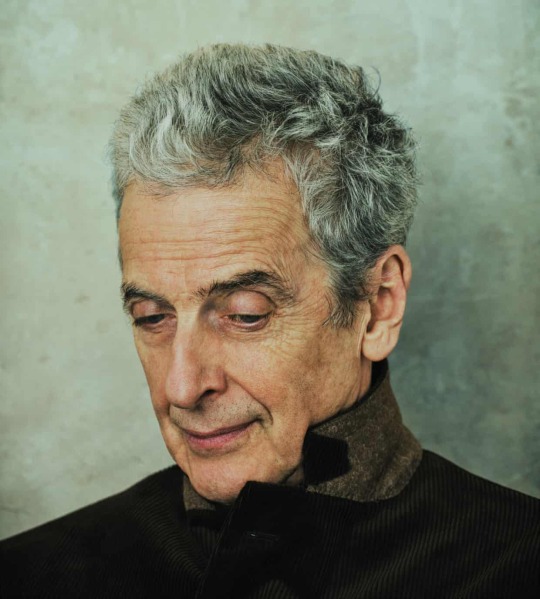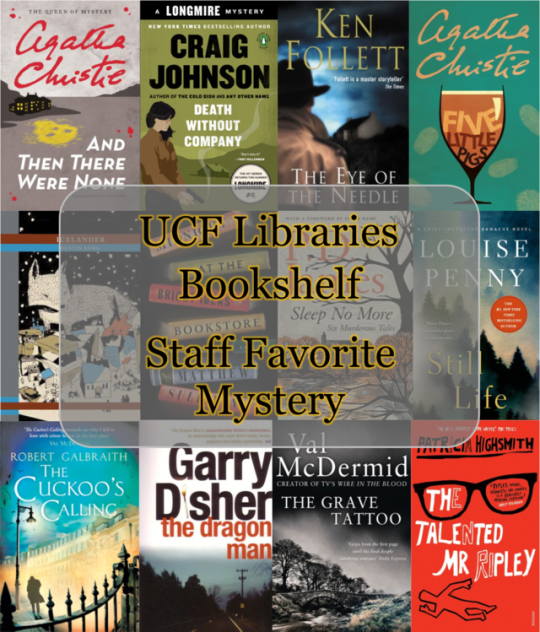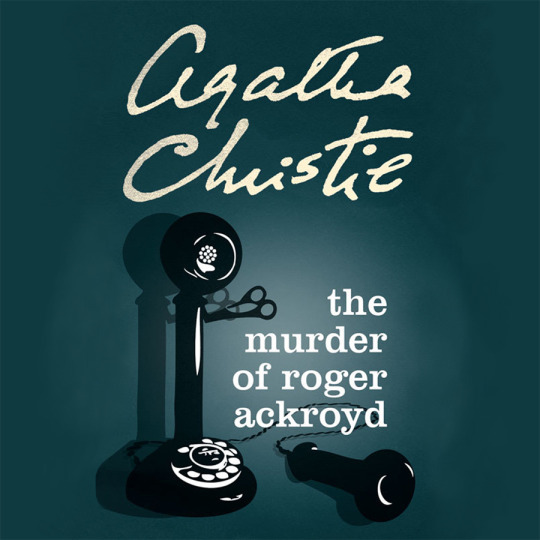#that poirot's been hiding in plain sight
Text



As we chat, the postman rings the bell, delivering packages. Council tree surgeons are working on the road outside. My son needs water, words of comfort, possibly he just wants another good long look at Capaldi. I’ve never interviewed anyone in my own home before and the limitations of the format are becoming apparent. But Capaldi seems to respond well to the setting and its lack of frills. His adult daughter and her family have been visiting, brand new baby in tow. When I apologise for all the noise and interruptions, Capaldi says it’s nothing compared to a newborn.
He and Collins were young parents themselves when his directing career fell apart. Arriving back in London from the disastrous Manhattan trip, “The initial feeling was shock. Then a pragmatic survival instinct kicked in.” Capaldi rejoined the auditioning circuit. “I was a psychiatrist in Midsomer Murders. I was a beekeeper in Poirot – AN Other Actor. Someone else would have turned down these parts first.” Collins, until that point an actor, too, decided to pivot into development and production, a career move that has worked well for her.
*
“This business is full of people who are not the real thing,” he says, “people I perceived to be artists ’cos they had posh accents, but who didn’t have it, they just sounded like they did.” He goes on to tell a tantalising but intentionally vague story about a major star he worked with, someone who revealed themselves through the course of an acting collaboration to be a dud hiding in plain sight. He won’t provide details (“Too easy to figure out. When everyone’s dead I’ll tell you”), but he says the experience changed him professionally, leaving him more aware of his own limitations, but grateful to have a little vinegar and grit in the mix. “There’s a kind of smoothness, a kind of confidence that comes from a good [paid-for] school. That’s what you’re struck by: they seem to know how to move through the world recognising which battle to fight, where to press their attentions. But it can make the acting smooth, which to me is tedious. I like more neurosis. More fear. More trouble, you know?”
*
In the new TV show, Criminal Record, he explores a more mortal kind of ageing, life’s third act, its inevitable professional humblings. Capaldi plays a London DCI in his 60s, coming to the end of a career, already moonlighting as a private security contractor, intimidated by the thrust and purpose of a younger colleague at the Met played by Cush Jumbo. As Jumbo’s character grows in confidence, Capaldi’s shrinks. It is a paradox of experience he can relate to. “I find the older I get, the closer I am to who I was,” he says.
I ask him to explain.
“Like I’m returning to… ‘roots’ is the wrong word. I feel more and more like my mother and father, more and more keenly aware of the values they had.” He provides an interesting example, how he has become all thumbs around the act of tipping in restaurants: “I can be in a complete sweat about that.” He can imagine his parents, both dead now, in a similar muddle. “From the background we come from, you can have a bit of anxiety about coming across as grand. So you have to allay that by making sure you are communicating with everybody, all the time.”
Capaldi shakes his head, chuckling softly. He has finished his coffee. He’s about to put on his big coat, say goodbye to my son, and walk back through Whoville to his home and his family. Before he leaves we return to the subject of actors from privileged backgrounds. He says he feels mean, like he took unfair advantage of them in their absence. “It’s not their fault,” he says. “It’s just that there’s less and less of my lot in the arts.” And this concerns him, he continues, because “people of all backgrounds are sophisticated, are interesting, are equally prone to tragedy and joy. Any art that articulates that is a comfort. Art is the ultimate expression of you are not alone, wherever you are, whatever situation you are in. Art is about reaching out. So I think it’s wrong to allow one strata of society to have the most access.”
He nods, feeling he’s expressed himself better. I agree.
The whole interview over at The Guardian.
#Peter Capaldi#The Observer Magazine#Criminal Record#Part of the interview but link to the whole thing
94 notes
·
View notes
Photo

For the month of December, the UCF Libraries Bookshelf celebrates the favorite books of employees of the UCF Libraries. These are the books we have (and will continue to) read many times over the course of our lives. The genre for our 2017 staff favorites is mystery novels.
Click on the keep reading link below to peruse our favorite mysteries and learn where to find them.
And Then There Were None by Agatha Christie
Ten strangers, apparently with little in common, are lured to an island mansion off the coast of Devon by the mysterious U.N. Owen. Over dinner, a record begins to play, and the voice of an unseen host accuses each person of hiding a guilty secret. That evening, former reckless driver Tony Marston is found murdered by a deadly dose of cyanide. The tension escalates as the survivors realize the killer is not only among them but is preparing to strike again and again!
Suggested by David Benjamin, Special Collections and University Archives
Death Without Company by Craig Johnson
When Mari Baroja is found poisoned at the Durant Home for Assisted Living, Sheriff Longmire is drawn into an investigation of her death that proves to be as dramatic as her life. Her connections to the Basque community, the lucrative coal-bed methane industry, and the personal life of the previous sheriff, Lucian Connally, lead to a complex web of half-truths and assumed allegiances. As the specter of Mari's abusive husband arises, Sheriff Longmire, aided by his friend Henry Standing Bear, Deputy Victoria Moretti, and newcomer Santiago Saizarbitoria, must connect the past to the present to find the killer among then.
Suggested by Renee Montgomery, Teaching & Engagement
Eye of the Needle by Ken Follet
His code name was “The Needle.” He was a German aristocrat of extraordinary intelligence—a master spy with a legacy of violence in his blood, and the object of the most desperate manhunt in history. But his fate lay in the hands of a young and vulnerable English woman, whose loyalty, if swayed, would assure his freedom—and win the war for the Nazis. . . .
Suggested by Ven Basco, Research & Information Services
Five Little Pigs by Agatha Christie
Beautiful Caroline Crale was convicted of poisoning her husband, yet there were five other suspects. Sixteen years have passed, and Hercule Poirot is persuaded to investigate the murder.
Suggested by Judy Kuhns, UCF Connect Libraries
Icelander by Dustin Long
When Our Heroine’s dear friend is found murdered, it’s an obvious job for her mother, a legendary crime-solver and evil-thwarter. But her mother is dead, and Our Heroine has no interest in inheriting the business, or being chased through a sewer, or listening to skaldic karaoke, or fleeing the inhuman Refusirkir, or — But Evil has no interest in her interests, and thus: adventure ensues.
Suggested by Sara Duff, Acquisitions & Collections
Midnight at the Bright Ideas by Matthew J. Sullivan
Lydia Smith lives her life hiding in plain sight. A clerk at the Bright Ideas bookstore, she keeps a meticulously crafted existence among her beloved books, eccentric colleagues, and the BookFrogs—the lost and lonely regulars who spend every day marauding the store’s overwhelmed shelves. But when Joey Molina, a young, beguiling BookFrog, kills himself in the bookstore’s upper room, Lydia’s life comes unglued. Always Joey’s favorite bookseller, Lydia has been bequeathed his meager worldly possessions. Trinkets and books; the detritus of a lonely, uncared for man. But when Lydia flips through his books she finds them defaced in ways both disturbing and inexplicable. They reveal the psyche of a young man on the verge of an emotional reckoning. And they seem to contain a hidden message. What did Joey know? And what does it have to do with Lydia?
Suggested by Rachel Mulvihill, Teaching & Engagement
Sleep No More by P. D. James
It's not always a question of "whodunit?" Sometimes there's more mystery in the why or how. And although we usually know the unhealthy fates of both victim and perpetrator, what of those clever few who plan and carry out the perfect crime? The ones who aren't brought down even though they're found out? And what about those who do the finding out who witness a murder or who identify the murderer but keep the information to themselves? These are some of the mysteries that we follow through those six stories as we are drawn into the thinking, the memories, the emotional machinations, the rationalizations, the dreams and desires behind murderous cause and effect.
Suggested by Anna Dvorecky, Cataloging
Still Life by Louise Penny
Chief Inspector Armand Gamache of the Sûreté du Québec and his team of investigators are called in to the scene of a suspicious death in a rural village south of Montreal. Jane Neal, a local fixture in the tiny hamlet of Three Pines, just north of the U.S. border, has been found dead in the woods. The locals are certain it's a tragic hunting accident and nothing more, but Gamache smells something foul in these remote woods, and is soon certain that Jane Neal died at the hands of someone much more sinister than a careless bowhunter.
Suggested by Christina Wray, Teaching & Engagement
The Cuckoo’s Calling by Robert Galbraith
Working as a private investigator after losing his leg in Afghanistan, Cormoran Strike takes the case of a legendary supermodel's suspicious suicide and finds himself in a world of multi-millionaire beauties, rock-star boyfriends, desperate designers and hedonist pursuits.
Suggested by Lindsey Ritzert, Circulation
The Dragon Man by Garry Disher
A serial killer is on the loose in a small coastal town near Melbourne. Detective Inspector Hal Challis and his team must apprehend him before he strikes again. But first Challis must contend with the editor of a local news-paper who undermines his investigation at every turn and with his wife, who is attempting to resurrect their marriage through long-distance phone calls from a sanitarium where she has been imprisoned for the past eight years for attempted murder. His. The media is demanding to know what Challis is doing about the killer; his colleagues are either giving trouble or in it; and his past keeps coming back to haunt him.
Suggested by Patricia Tiberri, Interlibrary Loan & Document Delivery Services
The Grave Tattoo by Val McDermid
Suspense master Val McDermid spins a psychological thriller in which a present-day murder has its roots in the eighteenth century and the mutiny on the H.M.S. Bounty. After summer rains uncover a corpse bearing tattoos like those of eighteenth-century seafarers, many residents of the English Lake District can't help but wonder whether it's the body of one of the town's most legendary fugitives. Scholar and native Lakelander Jane Gresham feels compelled to finally discover the truth about the myths and buried secrets rooted in her hometown. What she never expected was to find herself at the heart of a 200-year-old mystery that still has the power to put lives on the line.
Suggested by Megan Haught, Teaching & Engagement/Research & Information Services
The Talented Mr. Ripley by Patricia Highsmith
Since his debut in 1955, Tom Ripley has evolved into the ultimate bad boy sociopath. Here, in this first Ripley novel, we are introduced to suave Tom Ripley, a young striver, newly arrived in the heady world of Manhattan. A product of a broken home, branded a "sissy" by his dismissive Aunt Dottie, Ripley meets a wealthy industrialist who hires him to bring his playboy son, Dickie Greenleaf, back from gallivanting in Italy. Soon Ripley's fascination with Dickie's debonair lifestyle turns obsessive as he finds himself enraged by Dickie's ambivalent affections for Marge, a charming American dilettante. A dark reworking of Henry James's The Ambassadors, The Talented Mr. Ripley serves as an unforgettable introduction to this smooth confidence man, whose talent for murder and self-invention is chronicled in four subsequent Ripley novels.
Suggested by Larry Cooperman, Research & Information
3 notes
·
View notes
Text
The Murder of Roger Ackroyd by Agatha Christie

Synopsis: The novel is about the murder of Mister Roger Ackroyd. A dagger to the back behind locked doors and a series of partial alibis. Hercule Poirot thought he would be retiring in the countryside but when the fiance of a missing man suspected of murder asks him for his help to seek the real killer, he can’t refuse.
My Quibs: It was as fantastic as you would expect of a master like Agatha Christie. Skip down if you don’t want to read my ode to the genius that is the queen of mystery. The general set up was your standard line up of suspects: the butler, the assistant, the niece, etc. Each with their own alibi and backgrounds distinctly different and yet somehow connected. Seeing Roger Ackroyd alive and in his last moments was new to me. You’d think it would make the reader too aware of the crime to be so close to it but this is another quality of Christie’s brilliance of hiding the obvious in plain sight. I haven’t read many of her other Poirot novels but he frustrated me a bit when I tried to follow his train of deductions by his jovial mockery of my clearly average sleuth skills. Not my favorite detective but he untangled cases in interesting ways, one of which was to accuse all suspected parties of hiding something. And then unveiling each secret one by one, narrowing the list until seemingly no one is left. Christie is a master at leading you along by a string and there’s nothing else to do but follow it.
Should you read it? If you are a fan of brilliant classic murder mysteries. It is an icon of it’s genre. Everything else aspires to or is inspired by it.
Similar reads? Personally, my favorite Agatha Christie is still And Then There Were None.
(Spoiler Alert!) Oh all the spoilers here. I was aware before I picked up this book that it was many people’s favorites so obviously there had to be an ingenius twist at the end. The thing I love most about the Christie’s I’ve read is that I’ll get close to the answer (enough that I feel a little prideful that subconsciously ‘I KNEW it was him/her’) but never confidently enough to not be delightfully surprised by the reveal. So I had decided near the end that it had to either be someone not suspected but who knew things (like Caroline - although motive would’ve been a difficult suspension of belief) or someone unassuming like the narrator. I KNEW IT! Almost! And what I loved even more was how it opened the door to thought about the unreliable narrator and the difference between believable truth and believable deception. We trust the author and that trust was automatically transferred to the narrator. And she capitalized on that. It also made me think about how that was similar to our current issue of fake news and the blind trust audiences are giving to unreliable voices. There’s a fine line around the concept of deception and she plays with it to expose where are weaknesses are. But is it a quality of humanity or a result of society?
What did you think of The Murder of Roger Ackroyd?
0 notes